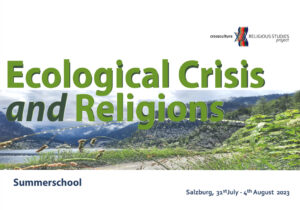
Crossculture Religious Studies Summer School 2023: Ecological Crisis and Religions
from 31.07. – 04.08.2023
The second SummerSchool of the Crossculture Religious Studies Project focuses on the topic ‚Ecological Crisis and Religions‘. Our ecosystem is under extraordinary stress, the predominantly human-made ecological crisis can no longer be overlooked and raises the question of the helpful contribution of religions in overcoming it. This is because religions and the ecological crisis, as cultural products of human beings, are intertwined in many ways. On the one hand, religions see humans in their responsibility for their living space and thus for the earth and the universe as the entire living world; on the other hand, the exploitation of the earth is also attributed to the influence of religions. The SummerSchool offers diverse contributions from the religious studies perspective of Buddhism, Hinduism, Christianity, Judaism, Indonesian and African tribal religions and other religion-related perspectives with representatives from the partner universities of the Crossculture Religious Studies project: Nairobi, Seoul, Munich, Haifa, Varanasi, Yogyacarta.
Participation is open to all interested and we feel honored to welcome you in Salzburg during the summer. Salzburg is not only known for its breathtaking festivals but also for its fluffy pastries, its green city mountains and its magnificent lakes. The Summer School is in cooperation with the Salzburger Hochschulwochen, which is an international and interdisciplinary summer university located in the heart of the city, founded in 1931 by the Benedictines of the entire German-speaking area and now an event of Paris Lodron University Salzburg.
Program
Monday 31.07.2023
09:00 Arrival
10:30 Registration, Welcome in HS 103
11:00 Martin Rötting: Introduction
12:00 Lunch
14:00 Lecture 1: Anna Magdalena Hoffmann: Religion(s) and Anthropogenic Climate Change – Ambivalence, Approaches and Prospects in view of the ‘Crossculture Religious Studies SummerSchool 2023
15.30 Lecture 2: Soonil Hwang: Buddism, life and Ecology
19:30 Student party (Yard of the Catholic-theological Faculty)
Tuesday 01.08.2023
9:00 Lecture 3: Wamae W. Muriuki: Some Japanese Buddhist Approaches towards Nature and Crisis
10:30 student papers
12:00 Lunch
14:30 Lecture 4: Nadinta Krishna: RELIGION AND ECOLOGY IN INDIA – Traditions and Challenges in HS 107
16:00 Lecture 5: Rajesh Kumar Jha: The Vedic Perspective on Nature
17.00 Round table debate: Historical focus
18:00 Supper
20:00 concert in the local residence
Wednesday 02.08.2023
9:00 Lecture 6: Dr. Zainal Abidin Bagir: Islam and Ecology
10:30 student papers
12:00 Lunch
14:00 Cultural Outing
19:30 Evening: Award Ceremony (in German) or free evening
Thursday 03.08.2023
9:00 Lecture 7: Edith Kayeli Chamwama: Reviving ancestral knowledge and practices for action against Climate Change Africa
10:30 Lecture 8: Rabbi Micha Odenheimer: Judaism and Ecology
12:00 Lunch
14:00 Lecture 9: Samsul Maarif: Indigenous Religion and Ecology
15.30 Lecture 10: Grace Darling: Indigenous Zeliangrong Environmental Ethics: A Philosophical Reflection
16.30 Urlich WInkler Award (UWA) Dissertation: Dr. Mathias Schneider, Buddhistische Interpretationen Jesus.
17:00 UWA Lecture for Comparative Theology: Prof. Dr. Bettina Bäumer und Dr. Christian Hackbart-Johnson
18:30 Evening: Sommerempfang Bischofsresidenz “Bishop + Tod”
Friday 04.08.2023
09:00 Lecture 11: Stefan Einsiedel: How to make sustainability work: Pope Francis‘ idea of „Integral Ecology“ and Amartya Sen’s „Capability Approach“
10:30 Round up
14:00 Departure
More information about the lectures:
Lecture 1: Religion(s) and Anthropogenic Climate Change – Ambivalence, Approaches and Prospects in view of the ‘Crossculture Religious Studies SummerSchool 2023 by Anna Magdalena Hoffmann, University of Salzburg
The topic of the presentation refers to the necessary differentiations that suggest themselves through the critical questioning of the role of religion(s) in their relation to climate change, which is now demonstrably recognized as anthropogenic. After diagnosing the category of religion(s) in a sociological and culturally conditioned context and in the relationship or tension to climate change the focus is put on climate change in its biophysical reality as the biggest challenge for the survival of mankind.
The centerpiece points from different perspectives to the complex and sometimes tense dimensions of the history of the relationship between the two cultural concepts and categories, which are reflected in the still young history of the research field –
(1) the processes of rapprochement, which follow the history of development and focus on questions from the beginnings of the research field ‚Religion and Ecology‘ as well as those from the emerging research field ‚Religion and Anthropogenic Climate Change‘ and the recently developing research field ‚Religion and Climate Change in the Anthropocene'(2) the ambivalence which has become visible in the indigenous perspective, and(3) various hopeful prospects, which have emerged or are emerging from the relationship between religion and climate change.
Lecture 2: Buddism, life and Ecology by Soonil Hwang, Dongguk University Seoul
Nowadays, Buddhism is experiencing growing popularity as an environmentally friendly philosophy that values all life based on ecological ideas. Buddhism, along with other Indian religions based on the circular worldview through the concepts of rebirth (saṃsāra) and action (karma), emphasizes the value of the environment and life. For those who believe in rebirth, all living beings around us are no different from us because we have been born in that form in the past or may be born in the future. Therefore, harming or destroying the living beings around us is a form of kindred abuse, an evil deed for which we will surely pay the price in the future.
While Buddhism recognizes endless rebirth, it does not accept the concept of a single unchangeable subject. Though Buddhists reject the existence of self or soul under the theory of anātman, it remains unanswered towards questions such as „is the self (ātman) or life (jīva) the same as the body?“ Similar questions numbering 10 or 14 were regarded as avyākata, meaning „that which is not explained or that which is not answered,“ rather than meaning „the inexpressible.“ An examination of early Buddhist texts shows that the term life (jīva) is used interchangeably with terms like breath, lifespan, body temperature, and consciousness. Thus, it is not straightforward to address questions such as „what to call life,“ „to what extent to see something as having life,“ and „what are the practical implications of not killing living beings“ in the context of early Buddhism. I am going to explore what to see life from Buddhist and Jain points of view in terms of the Buddhist concept of pramāda, which is often translated as laziness, idleness, or negligence.
Lecture 3: Some Japanese Buddhist Approaches towards Nature and Crisis by Wamae W. Muriuki, University of Nairobi
In recent years, Japanese religions have been looked towards as sources for a non-exploitative, ethical approach towards the natural world based upon an ethos of respect and spiritual awe. In particular, the Shinto notion of kami, as affective engines of awe and spiritual power, has been seized upon as a counter to Western ideologies that see nature only as a resource to be dominated and exploited. While this particular depiction of Shinto is indeed a distortion of both current and past orientations towards nature, Shinto derived ideas of the intrinsic value of nature can still be instructive for society in the 21st century. Weaving together Shinto ideas of kami, Tendai and Zen explorations of the buddha nature of „trees and grasses,“ and Pure Land Buddhist „crisis ethics,“ this presentation will show that, properly contextualized, these religious discourses can be a valuable source for inspiration and action to face the current global climate crisis.
Lecture 4: RELIGION AND ECOLOGY IN INDIA – Traditions and Challenges by Nadinta Krishna, Bombay University in HS 107
The last few centuries have left a legacy of a deteriorating physical environment. One part of the world is seeing a rise in living standards as development levels increase. But large developing societies are seeing increasing poverty and environmental problems leading to greater poverty and deprivation of basics like clean air, water and food. A healthy environment is essential for all existence. Clean air, water, food, land and energy, along with shelter and clothing are indispensable for basic existence, and their conservation and protection have become important international issues.
Ecology is the study of organisms, their interrelationship and the relationship between them and their environment. But there are spiritual and philosophical dimensions in the approach to the environment, and many of these have been tempered by religious traditions. In the West, the environmental movement began with scientists and social activists, whereas in India, from the beginning, there has always been an appeal to religious traditions to support environmental issues.
Hinduism, in all parts of India, has culturally similar traditions, with great diversity. Buddhism can be divided into two main traditions: Mahayana and Theravada (or Hinayana), while Jainism is similarly divided into two: Shvetamabara and Digambara. All three religions have great similarities, with varying ethical dimensions and common paths to achieve cosmic and natural harmony.
Lecture 5: The Vedic Perspective on Nature (Abstract) by Rajesh Kumar Jha, Banaras Hindu University Varanasi, India
Vedic culture is directly rooted in the Vedas, the earliest historical literature of the world. A major section of the Vedic literature is in the form of hymns, addressed to the various Vedic deities. Interestingly, the majority of these Vedic deities are depicted as being closely associated with various terrestrial and extra-terrestrial entities and forces. Further, the very connotation of ‘deva’ or a deity in the Vedic framework shows its affinity with the various aspects of nature. Even the concept of a Vedic sacrifice or ‘yajña’ is closely associated with the nature surrounding us. Above all, the supreme Vedic ideal of ‚Ṛta’ too is presented with reference to, not only the nature surrounding us on our planet but with reference to the whole cosmos. The concept of Dharma succeeded the Vedic concept of Ṛta in the age of Purāṇas and it represents a very important concept and ideal of the Vedic culture. Interestingly, the concept of Dharma too has a primary connotation that is intimately connected with the various aspects of nature surrounding us. Thus, the religious and philosophical framework of the Vedas and the Vedic tradition has an intimate reference and relationship with nature. My article would endeavour to explore the various aspects of the relationship existing between the Vedic religious – philosophical framework and nature.
Lecture 6: Islam and Ecology by Zainal Abidin Bagir, Gadjah Mada University Jogjakarta
Muslims’ discourse about environmental problems started early in the 1960s, marked prominently by the prominent Muslim philosopher Seyyed Hossein Nasr’s series of lectures in 1966 at the University of Chicago. Yet for decades after that, there was not much attention among Muslim scholars on this issue.
In the last two decades the discourse has thrived in parallel with the growth of “religion and ecology” in general, marked among other things by the publication of the Harvard Series in on World Religions and Ecology (around the year 2000s). Even then the attention to environmental issues is not central in the broader landscape of contemporary Islamic thought, which is occupied by responses to current political issues such as radicalism and terrorism, human rights, and the equality of women and religious others. Nevertheless, along with the attention to environmental crisis among world religions, and the call for them to take part in responding to this issue, Islam and ecology/environment discourse has also developed considerably.
The discourse consists of, among other things, attempts to identify and reconstruct particular Islamic teachings, based on the two canonical sources of Islam, Qur’an and Hadith, but also to recover classical Islamic legal corpus (shari’a/fiqh) to respond to a variety of contemporary environmental issues. Central in this discourse is critique of modernity, esp. modern science and technology, economic system, and lifestyle. In this regard, there is no shortage of potent concepts, such as khalifa (commonly translated as stewardship), mizan (balance), etc. However, there is also question about whether Islam, as a monotheistic religion, in which humans occupy a special place, supports anthropocentrism which, in turn, is regarded as the (philosophical/attitudinal) root cause of today’s environmental crisis.
Recently the Islam and ecology discourse has been enriched by more contemporary analytical tools such as ecofeminism. Complementing the dominant discourse that is characterized by its mostly textual-normative approach, more recent studies have also paid attention to practices of Muslim environmentalism, understood broadly, which also generates new Islamic/Muslim normativities. My presentation will illustrate the above trends and more specifically looking at contemporary Muslim environmentalist practices in several countries, where Muslims constitute majority or minority population, in Asia as well as the Western countries.
Lecture 7: REVIVING ANCESTRAL KNOWLEDGE AND PRACTICES FOR ACTION AGAINST CLIMATE CHANGE AFRICA by Edith Kayel Chamwama, University of Nairobi
The relationship between human beings and nature is one of the enduring relationships in Africa. For a very long time, peoples of the continent have had an intimate relationship with nature. Over centuries, there have been areas and objects of nature that have been handled with care and reverence as sacred groves. This has been instrumental in the conservation of the environment. Through knowledge and practices handed down generations, many people on the continent have been involved and contributed to conservation strategies and mitigation of climate change. In this paper, drawing from literature and field research findings drawn from Kenya, I seek to examine African traditional methods of environmental conservation and their application in the present discourse on climate change. It is notable that even though Africa has least contributed to elements that have led to climate change, it is disproportionately the most vulnerable region to the effects of climate change. This is characterized by an increase in temperatures, prolonged droughts, devastating floods, food insecurity and dwindling to extinction of animal and plant species. The question I seek to answer therefore is what indigenous knowledge and practices can we draw from for action against climate change in Africa?
Lecture 8: Judaism and Ecology by Rabbi Micha Odenheimer,Tevel b’Tzedek (NGO connecting Israel, Jews, and Judaism to the challenge of global poverty and environmental devastation
Although the notion of environmental devastation as an existential threat to life on earth was first fully articulated in the 20th century, deep concern for the health of the land, biodiversity, and the life of the non-human world is embedded in Jewish sources from the very start. Beginning with the Torah and the Prophets, this lecture will trace these ideas through the Talmudic and Midrashic period, touch on Kabbalah, the Jewish mystical tradition and modern thinkers. Why, I will ask, are fundamentalist Jews as well as Christians often less sensitive to environmental issues than they might be, in light of traditional sources? How can these ideas be used in order to inspire changes that are needed today?
Lecture 9: Indigenous Religion and Ecology by Samsul Maarif, Gadjah Mada University Jogjakarta
This presentation will examine the genealogy of indigenous religion as an academic construction and its engagement to ecology, another academic construction. Indigenous religions as a subject of study in religious studies did not develop until recently, and the main issue for the study is how to include them in religious studies in inclusive ways. Material objects of it have been in fact from the beginning of religious study establishment, but they were mispresented through various pejorative terms such primitivism, animism, tribalism, syncretism, and so forth, or under the lens of the so-called “world religion paradigm”. This presentation will respond to it, and then offer an alternative, “indigenous religion paradigm” to engage the subject of ecology. Ecology as a concept that emphasizes relationship between human and nature will be examined as synonymous to indigenous religion. Using indigenous religion paradigm, this presentation will build up an argument that “being religious is being ecological”.
Data used in this presentation will be based on series of fieldwork on indigenous communities in Indonesia who, most of them, happen to be Muslims, Christians, Hindus, or Buddhists.
Lecture 10: Indigenous Zeliangrong Environmental Ethics: A Philosophical Reflectionby Grace Darling, Banaras Hindu University Varanasi, India
Zeliangrong Nagas are indigenous people living in the present Indian States of Assam, Nagaland and Manipur. The place they live is in a rich monsoon forest region with mostly mild summer, autumn and mild winter and lush-green spring season, that rich numerous flora and fauna are also found including rare species or even species that are not found so far in any parts of the world even. The geographical landscape includes high mountainous regions, hills, valleys, plains and many small streams, clear springs and big river systems. They have well-organized culture and religion which is not inferior to many other cultures and religions of the world. They did have purely democratic political governance at the rudimentary level in which the leaders or chiefs of the villages or communities were elected through a simple voting system for certain tenures like 3-5 years each. They have mythologies about the world’s creation and even about how different languages came into being after building a tower to reach the moon/sky but collapsed. The world is created by God, and also all other beings as well. Humans were created by taking a lump of clay from the ground and after God breathed on the head of the human beings, that, they began to have life. But the lives of other animals were also considered with high regard and respect. Proper moral behaviours were prescribed of how humans have to relate to the living and non-living surroundings around us. They did have land ethics, forest ethics, and even harvesting ethics or hunting ethics as well. But the indigenous practices hardly have any place where dominant culture and religion abound. Yet, we do have many things to learn from them which can contribute well to the academic study of religion and also to humanity. One important area is their environmental ethics which are directly or indirectly influenced by their die-hard religious beliefs in connection with the world and everything in it. The way they see the environment around them and relate to it can be analyzed through a philosophical lens. Few questions like whether they follow certain ethical behaviour because of fear of retribution, selfish motives, respect for rules or purely because of respect for others/nature towards both the living and non-living beings around them or because of their religious beliefs in relating to them.
*(Detail about various ethical behaviour towards the environment will be present in full paper later.)
Lecture 11: How to make sustainability work: Pope Francis‘ idea of „Integral Ecology“ and Amartya Sen’s „Capability Approach“ by Stefan Eindsiedel, University for Philosophy Munich
There is apparent competition between many of the UN Sustainability Goals. How can sustainable development succeed despite the many conflicts of interest? The lecture examines this question on the basis of the environmental-ethical impulses of Amartya Sen and Pope Francis. The theologian Pope Francis and the philosopher and Nobel laureate in economics Sen come from different religions and cultural backgrounds, but both focus in a special way on the „perspective of the poor“. Thus, they not only go back to the roots of their respective disciplines, but also give valuable advice on how sustainable development can succeed in a modern society. In this way, the lecture sheds light on current developments in Christian social teaching and shows how religion and the social sciences can make an important contribution to sustainable development.
Ulrich WInkler Award: Christian Hackbart Jonson and Bettina Bäumer
The Biographical Location of Interreligious Processes. Links between Micro- and Macro-historical Perspectives in the Interreligious Encounter between India and Europe by example of Austrian Scholar of Religion and Indologist Bettina Bäumer (*1940) . A research project on the interreligious biography of Bettina Bäumer sponsored by the Austrian Science Fund (FWF) was conducted at the Centre for Intercultural Theology and the Study of Religion of the University of Salzburg from 2016-2019. Two books are coming out of the project which are still being written. One is an autobiographical memoir of Bettina Sharada Bäumer who was born in Salzburg during World War 2 to an artists’ family with Jewish background. A Catholic priest hid the Protestant family in his parish house in the mountains. As a student she met the half Spanish-half Indian Catholic priest Raimon Panikkar (1918-2010), went to Rome to study with him and converted to the Roman Catholic church. She went to India for the first time in 1963 to meet the Benedictine monk Henri Le Saux aka Swami Abhishiktananda (1910-1973), one of the main proponents of spiritual Hindu-Christian dialogue. After her doctoral thesis in Philosophy of Religion she went to India in 1967 and hast been staying in the holy city of Banaras since then with an intermission of 4 years (1974-1978). In 1987 she was initiated in the spiritual tradition of Nondual Kashmir Shaivism by the late Swami Lakshmanjoo (1907-1971) which she has been studying and teaching on a scholarly as well as spiritual level. At home in Hinduism as well as Christianity she is one of the rare bridges between two cultures and religions.The second book is a biographical study by Dr. Christian Hackbarth-Johnson, a Protestant theologian and scholar of religion. His doctoral thesis was on Henri Le Saux/Swami Abhishiktananda (2002). The present study will be split into two volumes, titled “Married to India”. The first volume which will be published this year covers the years 1940-1964 as well as a chapter on the wider historical context of the family background in late 19 th to mid 20 th century. The movement of spiritual interreligious dialogue of which Bäumer has been and still is a protagonist is seen as an answer to the historical questions posed by the catastrophic events of 20 th century history.
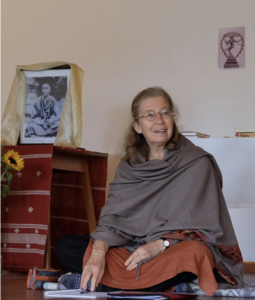
UWA 2023: Dr. Bettina Bäumer
formerly Visiting Professor at the Universities of Vienna, Bern and Salzburg and Fellow at the Indian Institute of Advanced Studyin Shimla, headed a research library in Varanasi, India (Abhinavagupta Research Library). 2002 Awarded Dr.h.c. (honoris causa) from the University of Salzburg (Austria) (first woman in the 380 years history of the University from the Faculty of Theology) 2012 Received the „Österreichisches Ehrenkreuz fur Wissenschaft und Kunst I. Klasse“ from the Austrian Government, Ministry for Science and Research (Ministerium fur Wissenschaft und Forschung) for her merits in the bilateral relations between India and Austria at the scholarly level.2015 Received the Padmashri award from the President of India in recognition of her contribution to the field of Literature and Education.Writing and publication during 2023 Dr. Kapila Vatsyayan had passed away in September 2020, and a Commemoration Volume dedicated to her has been prepared and edited by Dr. Advaitavadini Kaul. My contribution which contains two parts, my memories and an article, is titled: “Overcoming Opposites: Madhya in Kashmir Śaivism. A Tribute to Kapila Vatsyayan”. It is hoped that the volume will come out in 2022. published by D.K. Print-world. Paśyantī: Trika Śaivism of Kashmir. Themes and Practices, Bettina Sharada Bäumer, ed. by Sadananda Das, Aryan Books International, Delhi 2023, Die Spiritualität der Tantras. Abhinavaguptas Essenz der Tantras und Hymnen, Bettina Bäumer, Verlag der Weltreligionen, Berlin, 2022. Science and Spirituality: Bridges of Understanding, ed. by Bettina Bäumer and Shivam Srivastava, IIAS Shimla and D.K. Printworld, New Delhi 2020. The Yoga of Netra Tantra: Third Eye and Overcoming Deat.
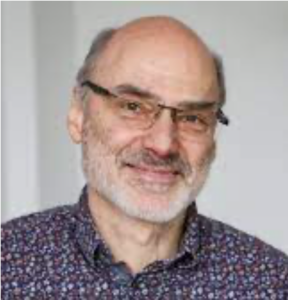
UWA 2023: Christian Hackbarth-Johnson
Growing up in Neufahrn/NB, I studied Protestant theology in Tübingen, Vienna and Munich from 1984 onwards and subsequently completed my training as a pastor in the Lutheran Church in Bavaria. In 1998 I moved with my family to Dachau to do my doctorate in religious studies at the University of Munich. The subject of my work was the topic of double religious identity: What happens when two religions come together in one person? I investigated this using the example of the Benedictine and Christian sannyasin Henri Le Saux. The work appeared in print in 2003 under the title „Interreligious Existence. Spiritual Experience and Identity in Henri Le Saux, O.S.B. / Swami Abhishiktananda (1910 – 1973).“ What interested me most was and is the possibility of spiritual or mystical experience. I have been practicing yoga and Zen meditation since 1985. In 1994 I received from my most important teacher, Prof. Dr. Michael von Brück, the assignment to introduce other people to the way of Zen. From 2000 to 2003 I trained with R. Sriram to become a yoga teacher in the tradition of Sri Krishnamach-arya, a yoga school in Chennai, India, which places great emphasis on adapting yoga to the individual circumstances of the practitioner in private lessons. Since 2008 I have been increasingly involved with the Integral Yoga of Sri Aurobindo. I am a member of the board of the associations Via Mundi e.V., Spiritualität im Dialog e.V., and of the foundation board of the Stiftung Spiritualität und interreligiöser Dialog.
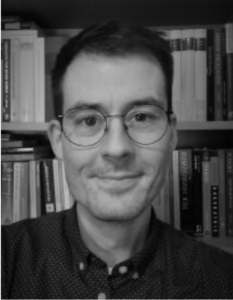
UWA 2023: Dr. Mathias Schneider
since 2020 Research associate at the Chair of Religious Studies and Intercultural Theology, Faculty of Protestant Studies, Münster, Germany. 2016-2020 PhD student in the research college „Religious Plurality and its Regulation in the Region“(RePliR) at the Center for Religion and Modernity (CRM) of the University of Münster. 2016 First theological exam in Protestant theology (exam paper: „Buddhism in the thought of John Hicks“). 2012-2013Study of Islamic Studies in Münster. 2012Student assistant at the Chair of Old Testament at the Kirchliche Hochschule Wuppertal. 2010-2012 Tutor for ancient Hebrew at the Kirchliche Hochschule Wup- pertal. 2010-2016. Study of Protestant theology (parish ministry) in Wuppertal and Münster
Speakers
Mag. theol. Anna Magdalena Hoffmann MA
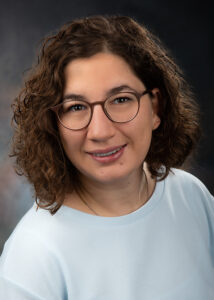
- Assistant Project Manager of the Crossculture Religious Project and SummerSchool since 2021
- Climate protection manager since 2021Project manager at a renewable energy company since 2022
- Education:
2012-2015. Leopod-Franzens University Innsbruck. Catholic Theology 2015-2016. Erasmus Year at Heythrop College London attending Lectures in MA Psychology of Religion and MA Abrahmitic Religions 2016-2019. Paris Lodron University Salzburg. Mag. theol. Catholic Theology 2019-2023. Paris Lodron University Salzburg. MA Religious Studies2021. Qualification for a Non-medical practitioner for psychotherapy 2022. Qualification for Climate Protection Manager
Dr. Samsul Maarif
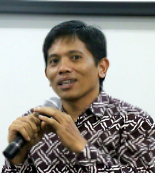
Head of the MA program of the Center for Religious and Cross-cultural Studies (CRCS), Graduate School, Universitas Gadjah Mada.
His research interests include religions of indigenous people, ecology, community development and advocacy. His latest research projects included: “Religious Perceptions on Environment in Indonesia”, “Documentary Films on Indonesian Pluralities”, and “Shifting Trends and Patterns Shaping the Environment for Tolerance and Radicalization”.
Education:
1995-1999. Institut Agama Islam Negeri (IAIN/ The State Institute for Islamic Studies) Alauddin, Makassar, Indonesia. S1 in Islamic Theology and Philosophy.
2001-2003. Gadjah Mada University Jogjakarta, Indonesia. M.A in Religious and Cross-cultural Studies.
2004-2005. Florida International University, Miami, Florida. AS. MA in Religious Studies.
2006-2012. Arizona State University, Temple, Arizona. AS. Ph.D. in Religious Studies.
Dr. D.Phil Soonil Hwang
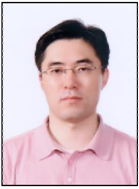
Associate Professor in the College of Buddhist Studies and also Dean of the College of Buddhism in Dongguk University in Seoul, South Korea.
His main field of research is the doctrinal history of Early Buddhism and Buddhist culture in South and Southeast Asia.
Education:
1985-1987 Hekwang High School, Pusan
1987-1993 Dept. of Indian Philosophy, Dongguk Univ. Seoul
1993 B.A. in Indian Philosophy
1993-1995 Graduate School, Dept. of Indian Philosophy, Dongguk Univ. Seoul 1995 M.A. in Early Indian Buddhism
1996-2002 Dept. of Oriental Studies, Oxford University
2003 D.Phil. Oxford University
Courses: Early & sectarian Buddhism
Prof. Martin Rötting
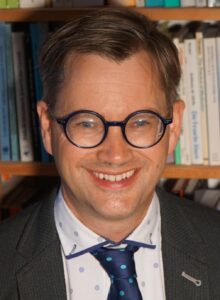
Associate Professor of Religious Studies and Head of the Religious Studies programme at the Center for Intercultural Theology and Study of Religions at Paris-Lodron University, Salzburg.
Education:
1990-1994. Studies in Religious Education at Catholic University Eichstätt
1999-2001. Studies in ecumenism at Trinity College Dublin, MA of Ecumenic Studies
2002-2007. Doctorate (Dr. phil.) in Religious Studies at the Ludwig- Maximilians-University Munich
2013-2018. Habilitation in Religious Studies at the LMU Munich
Research fields: Interreligious Learning, Present forms of Religion and Spirituality, Buddhist-Christian Dialogue, Contemporary forms of Buddhism, Multifaith Spaces.
Dr. Edith Kayeli Chamwama

Edith Kayeli Chamwamas specialty is in African Religion and African Christianity.She is a member of various professional bodies that include the The Circle of Concerned African Women Theologians (CCAWT), African Association of the Study of Religion (AASR).
She is involved in various research projects that contribute to her academic work and growth. Her research interests are in African Religion and its intersection with the contemporary Issues affecting the people of Africa ranging from Christianity, Ecology, Development and Health among other issues.
Education: Assistant Director in charge of Publications at the Maryknoll Institute of African Studies2014 started working at University of Nairobi
Prof. Dr. Nanditha Krishna
Born in 1951. She is an historian, environmentalist and writer based in Chennai and has a Ph. D. in Ancient Indian Culture from Bombay University, where she specialized in Indian art and religion and was also a Heras scholar.
She has been a Professor and Research Guide for the Ph.D. programme of CPR Institute of Indological Research. Krishna is the founder of the C.P. Art Centre, and CPR Institute of Indological Research and CPR Environmental Education Centre in Chennai and the Shakunthala Jagannathan Museum of Kanchipuram, apart from several educational institutions.
In Kooperation with:
Prof. Dr. Grace Darling
Associate Professor, Department of Philosophy & Religion, Banaras Hindu University,
MA in Philosophy from North-Eastern Hill University, Shillong (NEHU), M.Phil in Philosophy from North-Eastern Hill University, Shillong, Topic of Dissertation: Ludwig Feuerbach on Religion: A Critique, Ph.D in Philosophy from North-Eastern Hill University, Shillong, Topic: Zeliangrong Culture and Religion: A Philosophical Study, Post-Doc Research Exposure from University of North Texas (UNT), USA, Area of Research: Environmental Philosophy
Dr. Wamae W. Muriuki
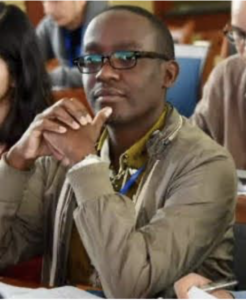
Dr. Wamae Muriuki is a lecturer in the Department of Philoso- phy and Religious Studies. He graduated with a PhD in Compara- tive Studies of Religion from the Ohio State University in 2012. His area of specialization is in Japanese Buddhism, particularly Japanese True Pure Land Buddhism, or Jodo Shinshu, on which he wrote his PhD dissertation. At the University of Nairobi, he teaches courses on Comparative Religion, Interfaith Relations, and specialised courses on Hindu and Buddhist thought. His current research interests focus on Kenyan converts to Hinduism and Buddhism, and their contested relationship to the dominant religious paradigm.
Rabbi Micha Odenheimer
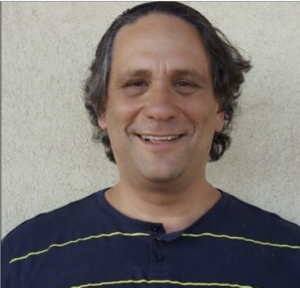
Founding Director of TEVEL b’Tzedek Rabbi, writer, journalist, social activist, founder and director of Tevelb’Tzedek. Born in 1958 in Berkeley California, Micha Odenheimer has been a writer, journalist, Jewish teacher and social activist in Israel since making aliyah 31 years ago. Micha was awarded a BA in Religion from Yale University Cum Laude in 1980, and was ordained as a Rabbi by Rabbi Moshe Feinstein of blessed memory in 1984. Micha was also a close student of Rabbi Shlomo Carlebach. Micha’s life and interests include fields rarely seen in combination. He has reported from Ethiopia, Haiti, Somalia, Nepal, India, Myanmar, Indonesia, Thailand, Bangladesh and Iraq, often during times of crisis. As a rabbi he has written dozens of essays on Judaism the Torah, and social justice, and has reported on trends in Judaism and the Jewish world. Micha has a special interest in Jewish mysticism and Hasidism. In 1994 Micha founded the Israel Association for Ethiopian Jews, a watchdog and advocacy organization that aimed to change the way the Israeli government and other institutions absorbed Ethiopian Jews, particularly in the field of education, housing and employment. The Israel Association changed its name to Association of Ethiopian Jews in 2016. Micha is still a board member. In 2007, Micha founded Tevel b’Tzedek, whose goal is to connect Israel and the Jewish people to the challenge of healing poverty and environmental destruction on a global level and in Israel as well.
Prof. Dr. Zainal Abidin Bagir
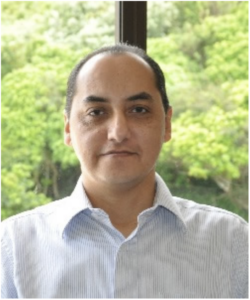
He is the executive director of the Center of Religious and Cross Cultural Studies at Gadjah Mada University in Indonesia. Bagir specializes in philosophy of religion, religion and science, and religion and ecology. He is the author of Science and Religion in the Post-Colonial World: Interfaith Perspectives (2005). Bagir was also a part of the Christianity and Freedom Project headed by the Berkley Center’s Religious Freedom Project. He received a bachelor’s degree in Mathematics from the Bandung Institute of Technology, Indonesia; a master’s degree in Islamic Philosophy from the International Institute of Islamic Thought and Civilization, Malaysia; and a doctorate in the History and Philosophy of Science from Indiana University.





